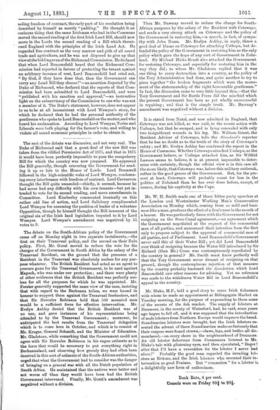The debate on the South-African policy of the Government came
off on Monday night in two separate instalments,—the first on their Transvaal policy, and the second on their Zulu policy. First, Mr. Gorst moved to reduce the vote for the -charges of the Government in South Africa by the salary of the Transvaal Resident, on the ground that the presence of a Resident in the Transvaal was absolutely useless for any pur- pose whatever. The British Resident had acted as an agent to procure gnus for the Transvaal Government, to be used against Mapoch, who was under our protection; and there were plenty of other evidences that the British Resident was perfectly use- less for all the purposes for which he was appointed. Mr. Forster generally supported the same view of the case, insisting that with regard to the Bechnana tribes, we were bound in honour to support them against the Transvaal freebooters, and -that Sir Hercules Robinson held that 500 mounted men would be a sufficient force for effective intervention. Mr. Evelyn Ashley denied that the British Resident was of no user and gave instances of his representations being attended to by the Transvaal Government ; moreover, he anticipated the best results from the Transvaal delegation which is to come here in October, and which is to consist of Mr. Kruger, General Schmidt, and the Minister of Education. Mr. Gladstone, while remarking that the Government could not agree with Sir Hercules Robinson in his vague estimate as to the force that would be necessary to put everything right in Bechuanaland, and observing how grossly they had often been deceived in this sort of estimate of the South-African authorities, urged that what the Government had to consider was the danger of bringing on a general war with all the Dutch population of South Africa. He maintained that the natives were better and not worse off than they would have been had the British Government intervened. Finally, Mr. Goret's amendment was negatived without a division.


































 Previous page
Previous page